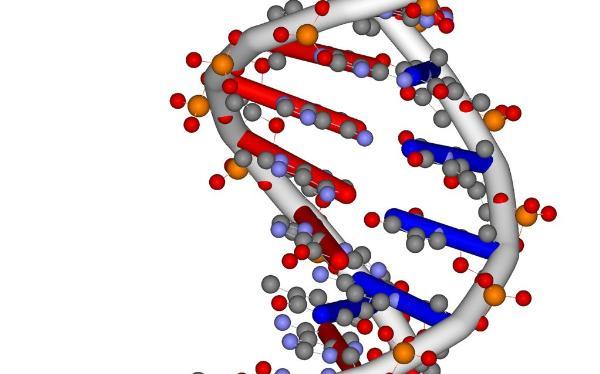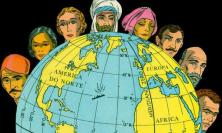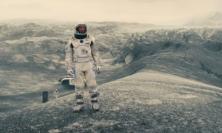In a Darwinian evolutionary framework, according to which human beings came into existence via the same process of descent with modification as every other living being, how can we still claim to have a unique place in the natural order? Frances Murphy argues that we can still adhere to Darwinism and preserve our belief in our special ontological status.
Darwinian evolutionary theory and its development in such fields as sociobiology and evolutionary psychology are now staple features of the intellectual climate. To say that the relationship of evolutionary theory to religion, and in particular to Christianity, has been somewhat controversial would be an understatement; a commitment to one was for a long time assumed to preclude any adherence to the other.
However, despite the apparent difficulties of holding Christian belief and asserting the truth of the theory of evolution, several theologians from the mid-twentieth century onwards have begun to take seriously the arguments presented in favour of evolutionary theory, and attempted to incorporate evolutionary ideas into their theology, a notable example being the French Jesuit Pierre Teilhard de Chardin. In 1950, Pope Pius XII encouraged research into the theory of evolution ‘in conformity with the present state of human sciences and sacred theology.’[1] In addition to the interest taken in evolution by theologians, there are many academics who would classify themselves primarily as evolutionary biologists who by no means reject the possibility of religious belief, even holding it themselves in many cases. Michael Ruse’s Can a Darwinian be a Christian?: the Relationship Between Science and Religion[2], for example, is saturated with affirmative answers to its titular question. It might serve us well to take a moment here to remind ourselves what we mean when we refer to Darwinian evolution – not least because the Darwinian framework is not the only (although it is the most widely accepted) way in which to formulate evolutionary ideas – and Ruse provides a helpful definition:
By Darwinism I understand a commitment to evolution – that all organisms, living and dead, have slowly emerged from just a few primitive forms, probably ultimately from inorganic matter. I understand also a commitment to natural selection, that the chief mechanism of change is differential reproduction brought on by the struggle for existence, with the major consequence being adaptation. I do not think that Darwinism necessarily implies that selection is the only mechanism or that every last detail of organic life is adapted, but selection as cause and adaptation as effect are the overwhelming factor.[3]
Some of the reasons to which we can attribute the fault lines between Christians and evolutionists are obvious: we need only look to the opening chapter of the Book of Genesis to find one of them. A Darwinian explanation of the origin of human life, and in fact all life, is clearly incompatible with the account of God’s creation of the world in six days that we find on those pages if it is taken literally. However, we should not let the creationist opposition to Darwinian evolution be an obstacle to our attempts to discuss Christian faith and Darwinism together: the creation story in Genesis can be understood as allegory, as theology, as narrative; if we accept it as truth on a different level from a literal, historical level of truth then this need not be the end of the road of dialogue between Christian theology and Darwinism.
The Phenomenon of Man
But there have been other stumbling blocks on the path to dialogue between Christianity and Darwinism. One of the biggest challenges – and not just to Christians – that the advent of evolutionary theory has presented, is a calling into question of humankind’s conception of itself as fundamentally different from, dare we even say superior to, the rest of the natural order. Aquinas was clear that it was our rationality that allowed us to be distinguished us from all other animals. But, according to Darwin, our common ancestry with all other living beings, be it traceable to (relatively) recent history or to the origins of life itself, or to some point in between, suggests that the existence of our species is no more necessary or special than that of any other.[4] Any differences between ourselves and other living beings have arisen through the same processes as all other differences between all other species: those of descent with modification. So can we still maintain that we are ontologically unique; can we say that we differ from the rest of the natural order by kind, rather than degree, as we might have done unquestioningly before we had Darwinism to contend with? How are we now to make sense of the Christian claim that human beings – and we alone – are made in the image of God? How can we make sense of what we would want to call our human nature in a Darwinian framework?
Pierre Teilhard de Chardin would seem to suggest that the difference between ourselves and other species occurred as one of degree…but led to a change in kind. He postulates the idea that the self-consciousness of man represents a radical difference between man and animal, one that is not comparable to other evolutionary adaptations or increases in complexity:
Admittedly the animal knows. But it cannot know that it knows: that is quite certain….In consequence it is now denied access to a whole domain of reality in which we can move freely. We are separated by a chasm – or a threshold – which it cannot cross. Because we are reflective we are not only different but quite other. It is not merely a matter of change of degree, but of a change of nature, resulting from a change of state.[5]
What is crucial to recognise in Teilhard’s thought is that this ‘chasm’ that humankind has crossed does not entail a separatism between humanity and the rest of the biosphere. In fact, for Teilhard, the evolutionary process has been a steady journey towards consciousness, which the human race now possesses. ‘Man discovers that he is nothing else than evolution become conscious of itself, to borrow Julian Huxley’s striking expression.’[6] Humanity represents a new mode of being in the world, but is by no means separate from the world.
But how could this change of state that Teilhard postulates, occur? We want to maintain that the principles of descent and selection on which Darwinism relies were not violated, and that the appearance of self-consciousness, thought, a moral sense and so on, occurred through natural processes – but how? I will turn to this question shortly, as I would first like to consider briefly the question of whether or not the arrival of our human nature was random, inevitable, or intended.
An inevitable outcome?
For Teilhard, social existence is the culmination of the biological process of evolution.[7] It is hard to read a statement such as this without connotations of progress, design or purpose arising, discussions of each of which in relation to Darwinism could easily be the subject of entire theses in their own rights. But they are not without importance here.
The philosopher Daniel Dennett states that the evolutionary process is an algorithmic one, one that conforms to a series of laws and patterns. It is tempting to see humanity as the final goal of such a process, as its ‘final cause’ to use Aristotelian terms. But Dennett makes it clear that this is a fundamental error.[8] Natural selection, the chief mechanism of introducing variation into life, is blind; it cannot foresee any end to its action and so to say that the evolutionary process as driven by natural selection has always been heading towards a certain end is incorrect. According to this view, the origin of the human species was as random an occurrence as the origin of any other species.
What implications does this have for the status of mankind in the biosphere? On this picture, mankind has the privilege of being a self-aware species, the only species that manifests an appreciation and understanding of its existence, but this is nothing more than a chance outcome of the evolutionary process. Humanity then, while being arguably the ‘highest’ species (although we should be wary of using such terms: Darwin himself warned against using terms like ‘higher’ and ‘lower’ in terms of complexity of organisms[9]), should regard itself not as privileged or chosen, or the completion of a process, but as one phase in evolutionary history.
However, it has been argued conversely that evolution was always driving towards the arrival of humankind. This view has been argued for on scientific terms, even without any recourse to divine intervention or design. Dieter Wandschneider’s contribution to a recent anthology on the philosophical implications of Darwinism is an example of such an argument.[10] Wandschneider is adamant that there is a tendency towards higher complexity in evolution, that it does exhibit progression, and he sees the human mind as evidence of this development. The human mind, he says, is nature’s moving beyond itself. He concludes his argument thus:
… evolution has a goal: the human mind. In it nature transcends itself as nature and gains at the same time the potential to reveal the essence underlying nature. One thus underestimates mind if one views it only as something unnatural. It is also basically the supernatural and thus the potential for the completion and elevation of nature.[11]
What the human mind here represents is nature’s understanding of itself – the self-conscious mind is a product of the evolutionary process; only by producing the mind has nature been able to make any sense of itself, and it was always geared towards this.
Does Darwinism have the answer?
Whether or not the advent of human consciousness was a random occurrence or in fact the goal of evolution – and this question is surely of great importance to all who believe in a creator God and would be more inclined to hold something similar to the latter view in some form – we must still explain how it came about. Can we explain our seemingly unique ontological status in Darwinian terms? The origin of consciousness is hardly analogous to the origin of any physical feature, which a combination of Darwinian principles, Mendelian genetics and biochemistry can explain. The awakening of nature to itself most definitely deserves special consideration. For the creationist Christian, and even Christians who reject a literal interpretation of the Genesis account but will still allow for the possibility of divine action in the natural order, the question may well have a simple answer: God implanted souls in human beings and this accounts for their uniquely self-conscious state.[12] However, our approach at the moment is Darwinian and we cannot abandon the naturalism that it requires. We must try to explain the origin of self-conscious life, and this explanation typically arrives in the form of emergence.
An emergent property is one that arises as a result of interaction between other properties that have been selected for – it cannot be reduced to or exhaustively accounted for by the genetic combination from which it has indirectly resulted. It is more than the sum of its parts. Our language, moral sense, emotion, self-awareness and so on, can be classed as emergent properties. As the human genome came into existence through selection, it resulted in properties that no other organisms have possessed. The particular structure of the human being was a condition of the possibility of such mental capabilities that we have. That is not to say that any of the human capacities in question are reducible to a genetic level: we cannot point to any section of the human genome that codes for ‘self-consciousness’.
Differences between organisms that arise as a result of emergence are as much a part of the evolutionary process as those that occur directly as a result of the linear selection of a particular genotype. What is unique about differences that arise as emergent properties is that they cross a threshold level and therefore appear as differences in kind rather than differences in degree.[13] The denial of an association between emergentism and reductionism is subtle but crucial:
Human consciousness could thus be an evolutionary by-product of other capacities that were more directly favoured by natural selection. Such a biological account of the origins of human consciousness does not imply a reductionist materialism in the philosophy of mind, and it certainly does not imply that because of these humble origins the human mind is less valuable or less important for the picture we form about what it means to be a human being.[14]
It seems, then, that Darwinian evolutionary theory can offer insight into how we can talk meaningfully of the unique status of human beings in the natural world. Even so, there are many inter-related issues that still need to be addressed (some of which, such as ideas of inevitability and progress, have already been mentioned). Could self-awareness only have emerged in the species Homo sapiens? Is our species the pinnacle, or end-point of the evolutionary process? To discuss all of these issues is outside the scope of this article, but let us for now suggest briefly the possibilities of what further theological discussion might result from the conception of the nature of humankind that we have been discussing.
Taking it further
John Milbank, in a discussion of the theology of Henri de Lubac, gives us an idea of how de Lubac along with earlier French Jesuit Teilhard de Chardin would see potential in a Darwinian framework for theological discourse, and suggests how we might discuss direction in evolution meaningfully without need for recourse to ideas of design:
…with Teilhard, he [de Lubac] reads the early stages of evolution not so much as teleologically directed to the later ones but more as ‘typologically’ foreshadowing them. What to atheist eyes might then seem the merely chance and adventitious in later ‘random’ mutation is rather, to the theologian, the sign of a completion in some sense ‘required’ by what went before, but nonetheless supplied as a surprising gift.[15]
De Lubac saw the evolutionary process as something that can speak to our faith and our theology, and I believe in fact that in de Lubac’s discussion of grace and nature can be found a tool to help us speak meaningfully, in Darwinian terms, about the real and significant effect that the atonement may have had on our human nature.
The enormous change to our worldview that came about with Charles Darwin’s work necessitates analysis, and particularly from the perspective of our faith. But we must be wary of doing our endeavour a disservice by falling into one of two traps. We must avoid falling victim to the all-too-rehearsed argument of the ultra-Darwinists, who would remove all objective content from religious belief by reducing it, and in fact everything we experience, including our own sense of self, to an illusion, an ‘epiphenomenon’ created by ‘our’ DNA for its own purpose, namely, replication. But we must also avoid, in our attempts to keep our faith away from the reductive grip of the ultra-Darwinist, being too hasty in saying that there are some aspects of our faith to which Darwinism cannot speak. We should not be so ready to invoke:
the traditional distinction between the ‘order of nature’ and the ‘order of grace’, arguing that the special events of the Atonement and the like were laid over and on the normal course of nature. After all, they would hardly have been that miraculous if they were common events! Of course, at some level you are stepping out of science here – out of Darwinism and methodological naturalism – but you are hardly denying Darwinism. Jesus did not make new species. The point is that you argue that Darwinism only goes so far, and then the miraculous takes over.[16]
To appeal to the ‘miraculous’ might not quite be our intention, but in any case surely we are beyond the days of science and religion being ‘non-overlapping magisteria’, to borrow a phrase from Stephen Jay Gould? As we seek knowledge and understanding about the world we inhabit, and about ourselves, we need to be open to the fruits of previous and further study into the theory that has revolutionised our worldview, and see the theory of evolution as an exciting subject matter and dialogue partner for theology, a source of insight into the human condition, rather than something to be dismissed or explained away.
Frances Murphy is Deputy Editor of Thinking Faith.
[1] ‘For these reasons the Teaching Authority of the Church does not forbid that, in conformity with the present state of human sciences and sacred theology, research and discussions, on the part of men experienced in both fields, take place with regard to the doctrine of evolution, in as far as it inquires into the origin of the human body as coming from pre-existent and living matter - for the Catholic faith obliges us to hold that souls are immediately created by God.’ (Humani Generis, 1950, n.36: http://www.vatican.va/holy_father/pius_xii/encyclicals/documents/
hf_p-xii_enc_12081950_humani-generis_en.html)
[2]Ruse, Michael, Can a Darwinian be a Christian?: The Relationship Between Science and Religion (Cambridge: Cambridge University Press, 2001).
[3] Ruse, Michael, ‘Darwinism and Naturalism: Identical Twins or Just Good Friends?’ in Darwinism and Philosophy, edited by Vittorio Hösle and Christian Illies (Notre Dame, Indiana, University of Notre Dame Press, 2005), pp. 83 – 91, p. 83
[4] In fact, Darwin’s individualist ontology makes the notion that all members of a species have some necessary and fundamental feature difficult to hold: a species is really a category used for convenience at any given time, it is not an immutable form of which all members of that species are instances, thereby defining and distinguishing themselves from members of other species, but as a means of classification it is immensely valuable even if difficult to define.
[5] Teilhard de Chardin, Pierre, The Phenomenon of Man (London & New York: Collins, 1955), p. 184.
[6] Teilhard de Chardin, p. 243, emphasis added.
[7] Teilhard de Chardin, p. 246.
[8] Dennett, Daniel C., Darwin’s Dangerous Idea: Evolution and the Meanings of Life, (London: Allen Lane, 1995), p. 56.
[9] Graefrath, Bernd, ‘Darwinism: Neither Biologistic or Metaphysical’ in Darwinism and Philosophy, edited by Vittorio Hösle and Christian Illies (Notre Dame, Indiana, University of Notre Dame Press, 2005), pp. 364 – 379 (p. 373).
[10] Dieter Wandschneider, ‘On the Problem of Direction and Goal in Biological Evolution’ in Darwinism and Philosophy, ed. Hösle and Illies, pp. 196 -215.
[11] Wandschneider, p. 208.
[12] Wesley Wildmad argues that the Catholic Church, in its moral teaching, to some extent defends the view that a soul is injected into each and every human being at some point. (Wildman, Wesley J., ‘A Theological Challenge: Coordinating Biological, Social, and Religious Visions of Humanity’, Zygon, 33.4 [December 1998], 571 – 597 [p. 579].)
[13] Larry Arnhart, ‘The Darwinian Moral Sense and Biblical Religion’ in Evolution and Ethics: Human Morality in Biological and Religious Perspective, edited by Philip Clayton and Jeffrey Schloss (Grand Rapids, Michigan: Eerdmans, 2004), pp. 204 – 220 (p. 213).
[14] Graefrath, p. 368.
[15] Milbank, John, The Suspended Middle: Henri de Lubac and the Debate Concerning the Supernatural (Grand Rapids, Michigan: William B. Eerdmans, 2005).
[16] Ruse, ‘Darwinism and Naturalism’, p. 83.






